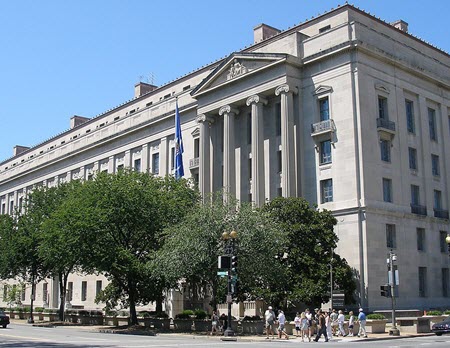Trump Administration Unveils Legislation to Regulate Social Media
Said internet platforms should not hide behind immunity to censor legal speech

The smarter way to stay on top of the streaming and OTT industry. Sign up below.
You are now subscribed
Your newsletter sign-up was successful
The Justice Department has provided Congress with a draft of its remake of Section 230 of the Communications Decency Act. The draft reflects DOJ's June recommendations and is meant to effect President Donald Trump's desire to hold social media sites to new standards of content moderation, stemming from his charge that they unfairly censor conservative speech.
Section 230 provides websites with immunity from civil liability for most of their decisions about what content to post or not to post.
Related: Trump Tackles the Edge
The key to the draft legislation is that it would make clear that "when interactive computer services willfully distribute illegal material or moderate content in bad faith, Section 230 should not shield them from the consequences of their actions," said Deputy Attorney General Jeffrey Rosen.
“For too long Section 230 has provided a shield for online platforms to operate with impunity,” said Attorney General Bill Barr in unveiling the draft. “Ensuring that the internet is a safe, but also vibrant, open and competitive environment is vitally important to America. We therefore urge Congress to make these necessary reforms to Section 230 and begin to hold online platforms accountable both when they unlawfully censor speech and when they knowingly facilitate criminal activity online.”
The Administration has separately asked the FCC to regulate social media content.
The Computer & Communications Association (CCIA) was troubled by the draft, as well as Barr's reported plans to meet with Republican attorneys general Wednesday (Sept. 23) to talk about what CCIA calls unsubstantiated claims that social media is biased against conservatives.
The smarter way to stay on top of the streaming and OTT industry. Sign up below.
“Amid a pandemic and an election, undermining the tools social media companies use to respond to problematic content like disinformation is more dangerous than ever," said CCI president Matt Schruers. "The U.S. Government should be enabling efforts to address nefarious content and behavior, not hamstringing them in misguided pursuit of political gain.”
Related: FCC As Edge Regulator
The following is DOJ's outline of what its draft would do:
"Promoting Transparency and Open Discourse
"First, the draft legislation has a series of reforms to promote transparency and open discourse and ensure that platforms are fairer to the public when removing lawful speech from their services.
"The current interpretations of Section 230 have enabled online platforms to hide behind the immunity to censor lawful speech in bad faith and is inconsistent with their own terms of service. To remedy this, the department’s legislative proposal revises and clarifies the existing language of Section 230 and replaces vague terms that may be used to shield arbitrary content moderation decisions with more concrete language that gives greater guidance to platforms, users, and courts.
"The legislative proposal also adds language to the definition of “information content provider” to clarify when platforms should be responsible for speech that they affirmatively and substantively contribute to or modify.
"Addressing Illicit Activity Online
"The second category of amendments is aimed at incentivizing platforms to address the growing amount of illicit content online, while preserving the core of Section 230’s immunity for defamation claims.
"Section 230 immunity is meant to incentivize and protect online Good Samaritans. Platforms that purposely solicit and facilitate harmful criminal activity — in effect, online Bad Samaritans — should not receive the benefit of this immunity. Nor should a platform receive blanket immunity for continuing to host known criminal content on its services, despite repeated pleas from victims to take action.
"The department also proposes to more clearly carve out federal civil enforcement actions from Section 230. Although federal criminal prosecutions have always been outside the scope of Section 230 immunity, online crime is a serious and growing problem, and there is no justification for blocking the federal government from civil enforcement on behalf of American citizens.
"Finally, the department proposes carving out certain categories of civil claims that are far outside Section 230’s core objective, including offenses involving child sexual abuse, terrorism, and cyberstalking. These amendments, working together, will be critical first steps in enabling victims to seek redress for the most serious of online crimes."
“President Trump’s Section 230 legislation is a mess, but one thing is clear – the proposed changes would make it harder to stop the misinformation and disinformation spread by the President and foreign governments," said Rep. Frank Pallone (D-N.J.), chairman of the House Energy & Commerce Committee. “Protecting Trump’s ability to lie to the public has been a hallmark of his presidency. We’ve seen it when he threatened broadcast stations, cable channels, reporters and now social media. Luckily, it is the job of Congress, not the President, to rewrite legislation. Undoubtedly, Section 230 reform is needed and important, but it should promote democracy and the public good – not further division and confusion.”
Contributing editor John Eggerton has been an editor and/or writer on media regulation, legislation and policy for over four decades, including covering the FCC, FTC, Congress, the major media trade associations, and the federal courts. In addition to Multichannel News and Broadcasting + Cable, his work has appeared in Radio World, TV Technology, TV Fax, This Week in Consumer Electronics, Variety and the Encyclopedia Britannica.

